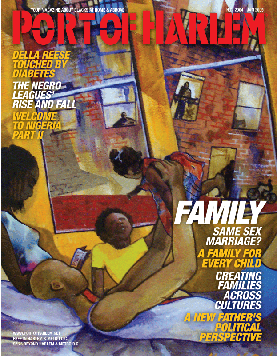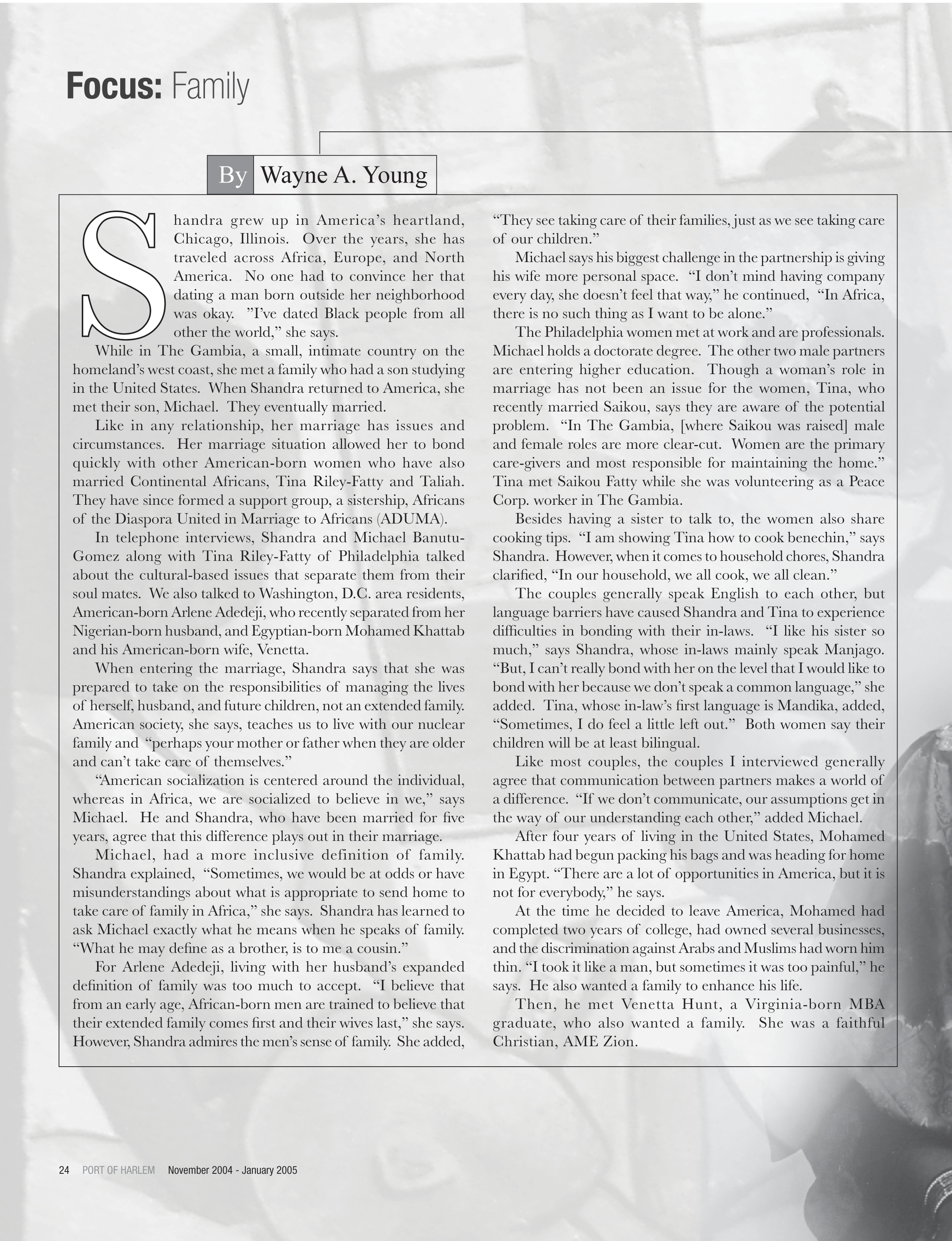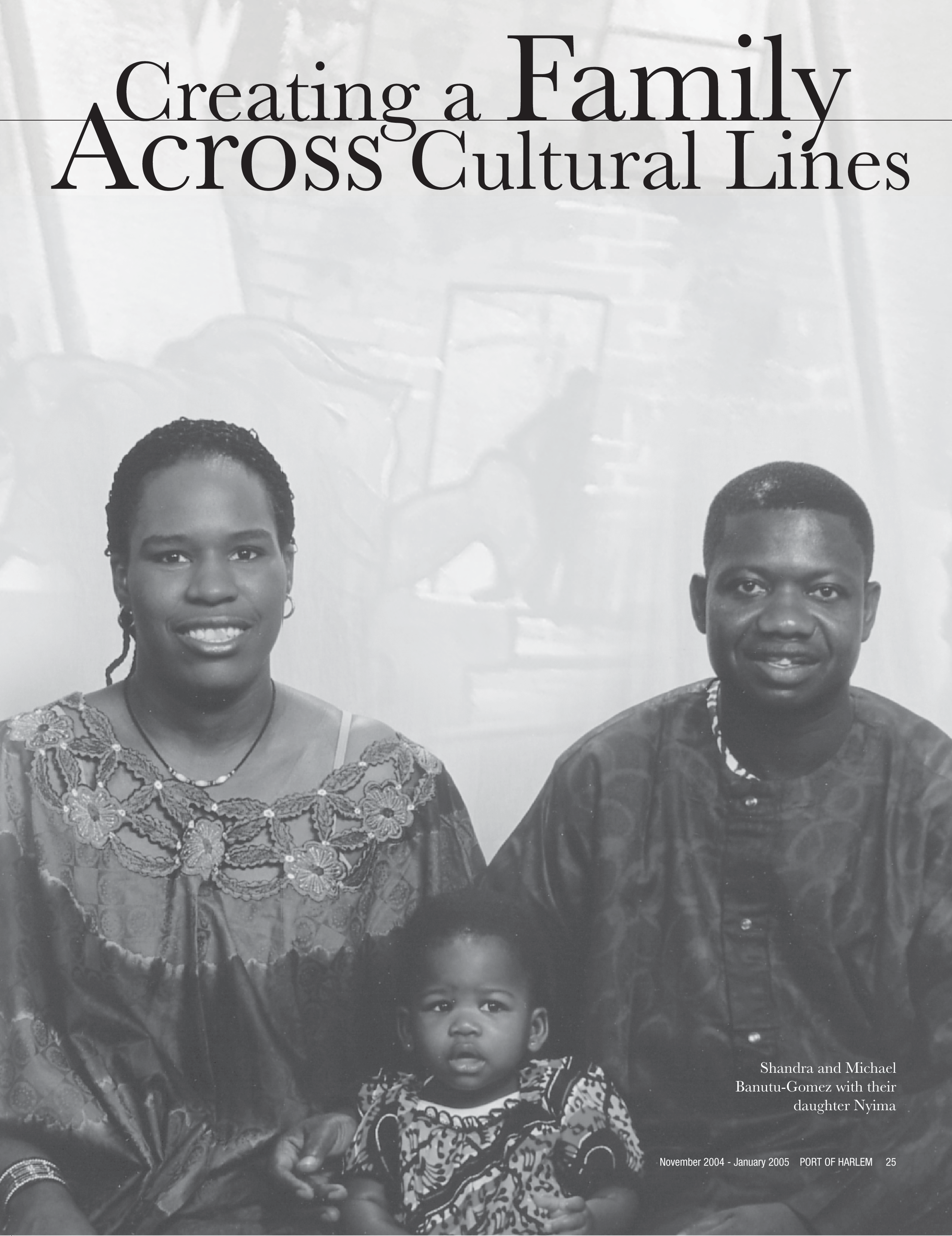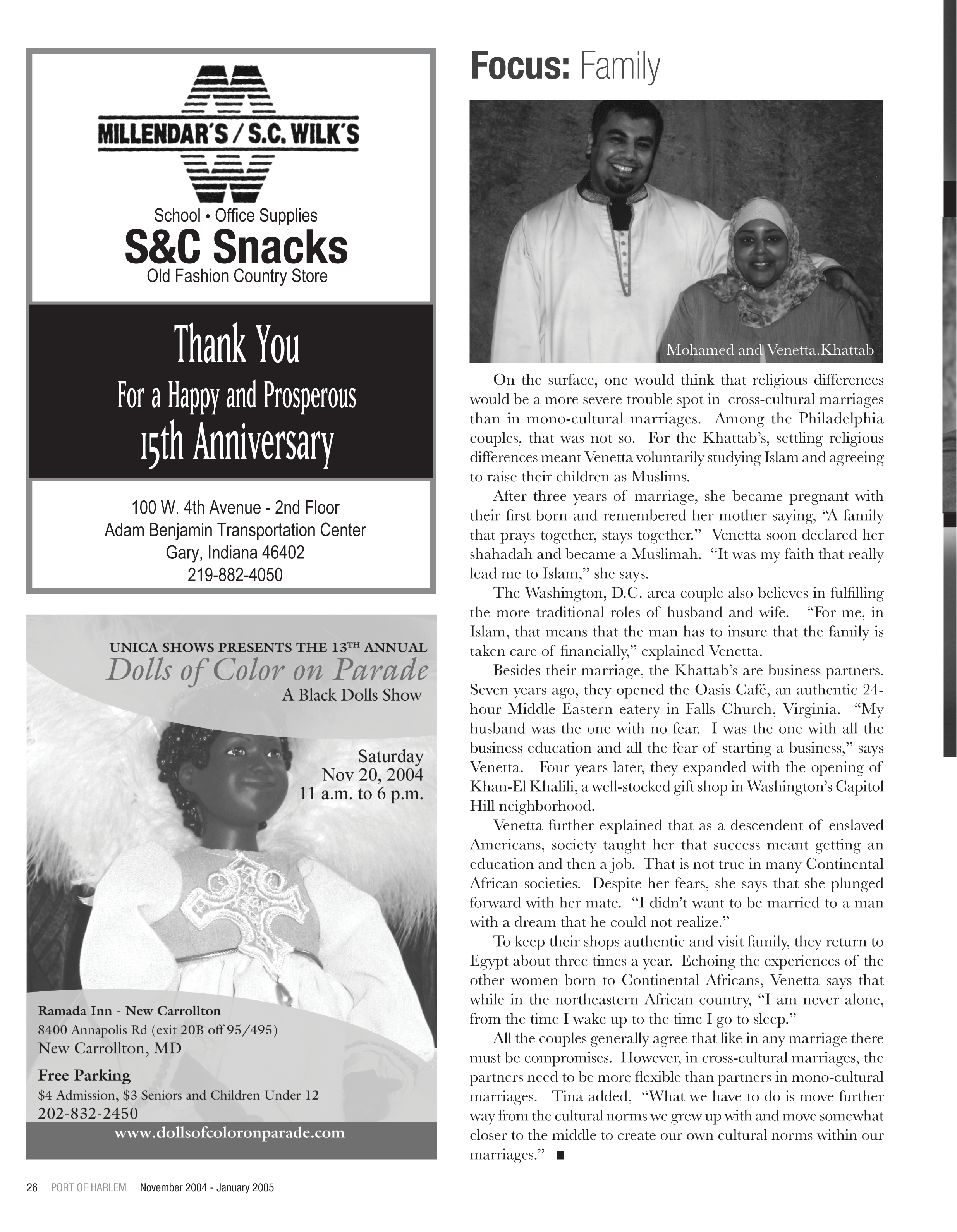Creating a Family Across Cultural Lines

On The Dock
COVER STORY
24 Creating Families Across Cultural Lines
African-American wives and their Continental African husbands share the challenges and joys of partnering with a person born in another country.
Original cover by Shaunte Gates
FOCUS Family
22 Same Sex Marriage - Yes!
23 Same Sex Marriage - No!
24 Creating a Family Across Cultural Lines
27 A New Father's
28 A Family For Every Child
DEPARTMENTS
4 LETTERS TO THE EDITOR
THE PUBLISHER’S POINT
5 Visions of Family
PRAISING THE PAST
6 The Rise and Fall of the Negro League
THE OTHER SIDE
7 Orange Juice, Blueberry Muffins, and Wet Eyes
A SHORT STORY
8 A Secret With Endimbaekena
PARENTING
9 The Home to School Connection
24 Creating Families Across Cultural Lines
African-American wives and their Continental African husbands share the challenges and joys of partnering with a person born in another country.
Original cover by Shaunte Gates
FOCUS Family
22 Same Sex Marriage - Yes!
23 Same Sex Marriage - No!
24 Creating a Family Across Cultural Lines
27 A New Father's
28 A Family For Every Child
DEPARTMENTS
4 LETTERS TO THE EDITOR
THE PUBLISHER’S POINT
5 Visions of Family
PRAISING THE PAST
6 The Rise and Fall of the Negro League
THE OTHER SIDE
7 Orange Juice, Blueberry Muffins, and Wet Eyes
A SHORT STORY
8 A Secret With Endimbaekena
PARENTING
9 The Home to School Connection
MONEY TALKS
10 Introducing Our Children to Personal Money Management
OUR SPACE
12 Blacks Added to King Memorial Design Team
TRAVEL STORY
14 Welcome to Nigeria - Part II of II
HEALTH
16 Della Reese, Touched by Diabetes
18 The Dilemma of Organ and Tissue Transplant
RECIPE
29 Della's Diabetes-Friendly Recipe
POETRY PIER
30 Tom Fisher, 38
BOOK REVIEW
31 The Blackbird Papers
ADVERTISERS LIST
32 Use this list to find our advertisers quickly
COMING UP
32 Artist Market, BZB Black Gift Show and more
ENTERTAINMENT
32 Old-Fashion Family Entertainment
10 Introducing Our Children to Personal Money Management
OUR SPACE
12 Blacks Added to King Memorial Design Team
TRAVEL STORY
14 Welcome to Nigeria - Part II of II
HEALTH
16 Della Reese, Touched by Diabetes
18 The Dilemma of Organ and Tissue Transplant
RECIPE
29 Della's Diabetes-Friendly Recipe
POETRY PIER
30 Tom Fisher, 38
BOOK REVIEW
31 The Blackbird Papers
ADVERTISERS LIST
32 Use this list to find our advertisers quickly
COMING UP
32 Artist Market, BZB Black Gift Show and more
ENTERTAINMENT
32 Old-Fashion Family Entertainment
;
;
Creating Families Across Cultural Lines
;
Shandra grew up in America’s heartland, Chicago, Illinois. Over the years, she has traveled across Africa, Europe, and North America. No one had to convince her that dating a man born outside her neighborhood was okay. ”I’ve dated Black people from all other the world,” she says.
While in The Gambia, a small, intimate country on the homeland’s west coast, she met a family who had a son studying in the United States. When Shandra returned to America, she met their son, Michael. They eventually married.
Like in any relationship, her marriage has issues and circumstances. Her marriage situation allowed her to bond quickly with other American-born women who have also married Continental Africans, Tina Riley-Fatty and Taliah. They have since formed a support group, a sistership, Africans of the Diaspora United in Marriage to Africans (ADUMA).
In telephone interviews, Shandra and Michael Banutu-Gomex along with Tina Riley-Fatty of Philadelphia talked about the cultural-based issues that separate them from their soul mates. We also talked to Washington, D.C. area residents, American-born Arlene Adedeji, who recently separated from her Nigerian-born husband, and Egyptian-born Mohamed Khattab and his American-born wife, Venetta.
When entering the marriage, Shandra says that she was prepared to take on the responsibilities of managing the lives of herself, husband, and future children, not an extended family. American society, she says, teaches us to live with our nuclear family and “perhaps your mother or father when they are older and can’t take care of themselves.” “American socialization is centered around the individual, whereas in Africa, we are socialized to believe in we,” says Michael.
He and Shandra, who have been married for five years, agree that this difference plays out in their marriage. Michael had a more inclusive definition of family. Shandra explained, “Sometimes, we would be at odds or have misunderstandings about what is appropriate to send home to take care of family in Africa,” she says. Shandra has learned to ask Michael exactly what he means when he speaks of family. “What he may define as a brother, is to me a cousin.”
For Arlene Adedeji, living with her husband’s expanded definition of family was too much to accept. “I believe that from an early age, African-born men are trained to believe that their extended family comes first and their wives last,” she says.
However, Shandra admires the men’s sense of family. She added, “They see taking care of their families, just as we see taking care of our children.” Michael says his biggest challenge in the partnership is giving his wife more personal space. “I don’t mind having company every day, she doesn’t feel that way,” he continued, “In Africa, there is no such thing as I want to be alone.”
The Philadelphia women met at work and are professionals. Michael holds a doctorate degree. The other two male partners are entering higher education.
Though a woman’s role in marriage has not been an issue for the women, Tina, who recently married Saikou, says they are aware of the potential problem. “In The Gambia, [where Saikou was raised] male and female roles are more clear-cut. Women are the primary care-givers and most responsible for maintaining the home.”
Tina met Saikou Fatty while she was volunteering as a Peace Corps worker in The Gambia. Besides having a sister to talk to, the women also share cooking tips. “I am showing Tina how to cook benechin,” says Shandra. However, when it comes to household chores, Shandra clarified, “In our household, we all cook, we all clean.”
The couples generally speak English to each other, but language barriers have caused Shandra and Tina to experience difficulties in bonding with their in-laws. “I like his sister so much,” says Shandra, whose in-laws mainly speak Manjago. “But, I can’t really bond with her on the level that I would like to bond with her because we don’t speak a common language,” she added.
While in The Gambia, a small, intimate country on the homeland’s west coast, she met a family who had a son studying in the United States. When Shandra returned to America, she met their son, Michael. They eventually married.
Like in any relationship, her marriage has issues and circumstances. Her marriage situation allowed her to bond quickly with other American-born women who have also married Continental Africans, Tina Riley-Fatty and Taliah. They have since formed a support group, a sistership, Africans of the Diaspora United in Marriage to Africans (ADUMA).
In telephone interviews, Shandra and Michael Banutu-Gomex along with Tina Riley-Fatty of Philadelphia talked about the cultural-based issues that separate them from their soul mates. We also talked to Washington, D.C. area residents, American-born Arlene Adedeji, who recently separated from her Nigerian-born husband, and Egyptian-born Mohamed Khattab and his American-born wife, Venetta.
When entering the marriage, Shandra says that she was prepared to take on the responsibilities of managing the lives of herself, husband, and future children, not an extended family. American society, she says, teaches us to live with our nuclear family and “perhaps your mother or father when they are older and can’t take care of themselves.” “American socialization is centered around the individual, whereas in Africa, we are socialized to believe in we,” says Michael.
He and Shandra, who have been married for five years, agree that this difference plays out in their marriage. Michael had a more inclusive definition of family. Shandra explained, “Sometimes, we would be at odds or have misunderstandings about what is appropriate to send home to take care of family in Africa,” she says. Shandra has learned to ask Michael exactly what he means when he speaks of family. “What he may define as a brother, is to me a cousin.”
For Arlene Adedeji, living with her husband’s expanded definition of family was too much to accept. “I believe that from an early age, African-born men are trained to believe that their extended family comes first and their wives last,” she says.
However, Shandra admires the men’s sense of family. She added, “They see taking care of their families, just as we see taking care of our children.” Michael says his biggest challenge in the partnership is giving his wife more personal space. “I don’t mind having company every day, she doesn’t feel that way,” he continued, “In Africa, there is no such thing as I want to be alone.”
The Philadelphia women met at work and are professionals. Michael holds a doctorate degree. The other two male partners are entering higher education.
Though a woman’s role in marriage has not been an issue for the women, Tina, who recently married Saikou, says they are aware of the potential problem. “In The Gambia, [where Saikou was raised] male and female roles are more clear-cut. Women are the primary care-givers and most responsible for maintaining the home.”
Tina met Saikou Fatty while she was volunteering as a Peace Corps worker in The Gambia. Besides having a sister to talk to, the women also share cooking tips. “I am showing Tina how to cook benechin,” says Shandra. However, when it comes to household chores, Shandra clarified, “In our household, we all cook, we all clean.”
The couples generally speak English to each other, but language barriers have caused Shandra and Tina to experience difficulties in bonding with their in-laws. “I like his sister so much,” says Shandra, whose in-laws mainly speak Manjago. “But, I can’t really bond with her on the level that I would like to bond with her because we don’t speak a common language,” she added.
Tina, whose in-law’s first language is Mandika, added, “Sometimes, I do feel a little left out.” Both women say their children will be at least bilingual.
Like most couples, the couples I interviewed generally agree that communication between partners makes a world of a difference. “If we don’t communicate, our assumptions get in the way of our understanding each other,” added Michael.
After four years of living in the United States, Mohamed Khattab had begun packing his bags and was heading for home in Egypt. “There are a lot of opportunities in America, but it is not for everybody,” he says.
At the time he decided to leave America, Mohamed had completed two years of college, had owned several businesses, and the discrimination against Arabs and Muslims had worn him thin. “I took it like a man, but sometimes it was too painful,” he says.
He also wanted a family to enhance his life. Then, he met Venetta Hunt, a Virginia-born MBA graduate, who also wanted a family. She was a faithful Christian, AME Zion.
On the surface, one would think that religious differences would be a more severe trouble spot in cross-cultural marriages than in mono-cultural marriages. Among the Philadelphia couples, that was not so. For the Khattab’s, settling religious differences meant Venetta voluntarily studying Islam and agreeing to raise their children as Muslims.
After three years of marriage, she became pregnant with their first born and remembered her mother saying, “A family that prays together, stays together.” Venetta soon declared her shahadah and became a Muslimah. “It was my faith that really lead me to Islam,” she says.
The Washington, D.C. area couple also believes in fulfilling the more traditional roles of husband and wife. “For me, in Islam, that means that the man has to insure that the family is taken care of financially,” explained Venetta. Besides their marriage, the Khattab’s are business partners.
Seven years ago, they opened the Oasis Café, an authentic 24-hour Middle Eastern eatery in Falls Church, Virginia. “My husband was the one with no fear. I was the one with all the business education and all the fear of starting a business,” says Venetta.
Four years later, they expanded with the opening of Khan-El Khalili, a well-stocked gift shop in Washington’s Capitol Hill neighborhood. Venetta further explained that as a descendent of enslaved Americans, society taught her that success meant getting an education and then a job. That is not true in many Continental African societies. Despite her fears, she says that she plunged forward with her mate. “I didn’t want to be married to a man with a dream that he could not realize.”
To keep their shops authentic and visit family, they return to Egypt about three times a year. Echoing the experiences of the other women born to Continental Africans, Venetta says that while in the northeastern African country, “I am never alone, from the time I wake up to the time I go to sleep.”
All the couples generally agree that like in any marriage there must be compromises. However, in cross-cultural marriages, the partners need to be more flexible than partners in mono-cultural marriages. Tina added, “What we have to do is move further way from the cultural norms we grew up with and move somewhat closer to the middle to create our own cultural norms within our marriages.”
Like most couples, the couples I interviewed generally agree that communication between partners makes a world of a difference. “If we don’t communicate, our assumptions get in the way of our understanding each other,” added Michael.
After four years of living in the United States, Mohamed Khattab had begun packing his bags and was heading for home in Egypt. “There are a lot of opportunities in America, but it is not for everybody,” he says.
At the time he decided to leave America, Mohamed had completed two years of college, had owned several businesses, and the discrimination against Arabs and Muslims had worn him thin. “I took it like a man, but sometimes it was too painful,” he says.
He also wanted a family to enhance his life. Then, he met Venetta Hunt, a Virginia-born MBA graduate, who also wanted a family. She was a faithful Christian, AME Zion.
On the surface, one would think that religious differences would be a more severe trouble spot in cross-cultural marriages than in mono-cultural marriages. Among the Philadelphia couples, that was not so. For the Khattab’s, settling religious differences meant Venetta voluntarily studying Islam and agreeing to raise their children as Muslims.
After three years of marriage, she became pregnant with their first born and remembered her mother saying, “A family that prays together, stays together.” Venetta soon declared her shahadah and became a Muslimah. “It was my faith that really lead me to Islam,” she says.
The Washington, D.C. area couple also believes in fulfilling the more traditional roles of husband and wife. “For me, in Islam, that means that the man has to insure that the family is taken care of financially,” explained Venetta. Besides their marriage, the Khattab’s are business partners.
Seven years ago, they opened the Oasis Café, an authentic 24-hour Middle Eastern eatery in Falls Church, Virginia. “My husband was the one with no fear. I was the one with all the business education and all the fear of starting a business,” says Venetta.
Four years later, they expanded with the opening of Khan-El Khalili, a well-stocked gift shop in Washington’s Capitol Hill neighborhood. Venetta further explained that as a descendent of enslaved Americans, society taught her that success meant getting an education and then a job. That is not true in many Continental African societies. Despite her fears, she says that she plunged forward with her mate. “I didn’t want to be married to a man with a dream that he could not realize.”
To keep their shops authentic and visit family, they return to Egypt about three times a year. Echoing the experiences of the other women born to Continental Africans, Venetta says that while in the northeastern African country, “I am never alone, from the time I wake up to the time I go to sleep.”
All the couples generally agree that like in any marriage there must be compromises. However, in cross-cultural marriages, the partners need to be more flexible than partners in mono-cultural marriages. Tina added, “What we have to do is move further way from the cultural norms we grew up with and move somewhat closer to the middle to create our own cultural norms within our marriages.”



Advertisers | Contact Us | Events | Links | Media Kit | Our Company | Payments Pier
Press Room | Print Cover Stories Archives | Electronic Issues and Talk Radio Archives | Writer's Guidelines




